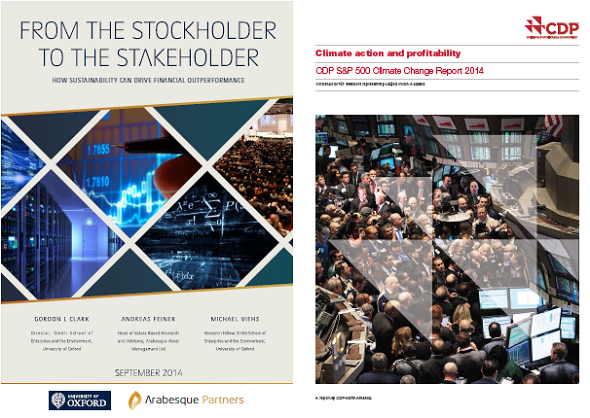Two compelling studies show that sustainability is essential and beneficial for business
Written by Mark Sait
Posted on September 24, 2014
Compelling evidence that sustainability is essential and beneficial for business is shown in two reports this week.

The studies provide more than ample data to reinforce the case for every company to fully embrace the idea of sustainable commercial development.
The first report, ‘From the Stockholder to the Stakeholder: How sustainability can drive financial performance’ offers eight key points for clarity and delves into the relationship between sustainability and corporate operational performance, the cost of debt and equity capital and stock prices.
The study by University of Oxford academics Gordon Clark and Michael Viehs with Andreas Feiner of Arabesque Asset Management found that companies with strong sustainability scores have better operational performance and are less risky while active ownership creates value for companies and investors.
They also discovered that investment strategies incorporating central sustainability elements of environmental, social and governance (ESG) issues outperform comparable strategies that ignore these.
‘From the Stockholder to the Stakeholder’ has eight key points:
- Sustainability is one of the most significant trends in financial markets for decades.
- The report represents the most comprehensive knowledge base on sustainability to date. It is based on more than 190 academic studies, industry reports, newspaper articles, and books.
- 90% of the studies on the cost of capital show that sound sustainability standards lower the cost of capital of companies.
- 88% of the research shows that solid ESG practices result in better operational performance of firms.
- 80% of the studies show that stock price performance of companies is positively influenced by good sustainability practices.
- Based on the economic impact, it is in the best interest of investors and corporate managers to incorporate sustainability considerations into their decision making processes.
- Active ownership allows investors to influence corporate behaviour and benefit from improvements in sustainable business practices.
- The future of sustainable investing is likely to be active ownership by multiple stakeholder groups including investors and consumers.
The second sustainability study published yesterday by CDP, an international, not-for-profit environmental data and measurement organisation shows how S&P 500 companies that have embedded sustainability strategies outperform those that fail to show climate change leadership.
‘Climate action and profitability’ shows that on climate change management, S&P 500 sustainability leaders:
- Generate superior profitability: 18% higher ROE than peers and 67% higher than companies who do not disclose on climate change
- Ensure more stability: 50% lower volatility of earnings over the past decade than low-ranking peers
- Grow dividends to shareholders: 21% stronger than low-ranking peers.
Leading economic sectors in sustainability development are transportation, consumer durables, apparel and health care equipment. The report advises that companies which have a strong financial performance set ambitious emissions reduction targets, use internal carbon pricing and have strong governance frameworks together with climate change risk management.
CDP concludes: “In this report, we answer the number one question US investors ask CDP about climate change data – ‘is there evidence of a link to financial performance?’ – with a resounding yes.
“By integrating climate change risk management into strategic planning, responding to CDP and taking action towards emissions reductions, companies are simply demonstrating a long-term view of how to best manage the assets of shareholders.”
The studies are refreshingly straightforward in style and should help to convince boardroom sceptics of the many benefits to be gained from a wholehearted adoption of corporate social responsibility that has sustainability at the core.